No products in the basket.
No products in the basket.
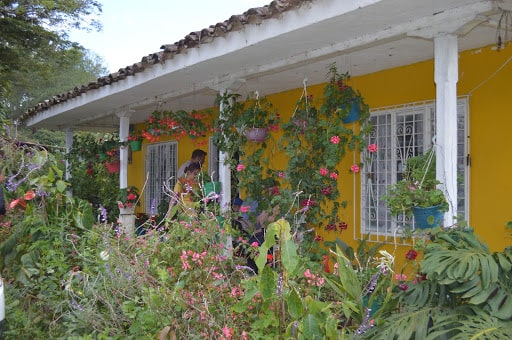
Colombia
Our Neighbourhood
Part two’s here if you’ve not read it.
After running into an acquaintance from a different UK-based coffee trader at breakfast (“Of all the gin joints in all the towns in all the world…”), we set off to the county of Piendamo, and more specifically, to a farm called Finca La Primavera, which is run by a family who have been farming Colombian coffee for a couple of generations. Between them, they have two qualified agronomists, a certified barista, and even a small home roasting setup.

The house at Finca La Primavera
We were shown around by two of the sons and then were joined by some more of the family at various stages. The land is separated into different parcels, which are all given individual names, and are technically owned by different members of the family, although they all work together to harvest, process and sell their coffee. Some of the names are older, some younger – the most distinctive was the “Toxicity” tablon, named after a favourite System of a Down song. This generated some laughter and some explanation that the English meaning of toxicity may not want to be associated with a coffee product!
Primavera had a mechanical dryer and solar dryers on site and a similar sized beneficio (processing plant) to that at Fince Cristalina, and they process the coffee the same day it is picked. Scattered across the various parcels is both red and pink Bourbon, red and yellow Colombia, Castillo, and Geisha. The farm is also home to various side projects, including an embroidery workshop (which supplies the local schools, as well as gifts), and various other endeavours. There’s something to be said for an extended family living side by side, helping each other out with the various projects, and continuing to grow coffee, in order to hand it to the next generation.
Following another bumper lunch, this time in Piendamo, we had time to call in one of the most progressive farmers in the region, Señor Andrès Roldan, whose farm is called Finca La Parcelita. He has a dazzling array of varietals growing on his farm, including one that I had never heard of, let alone seen. Guayaba is pretty unique amongst the other varietals we’ve ever seen, in that the flower sprouts out of the cherry. Whilst dodging a thunderstorm, and some torrential downpours we took a whistle-stop tour of the staggering number of varietals that Andrès cultivates: orange Bourbon, pink Bourbon, Colombia, Castillo, Geisha, Caturra, Typica, and the mystical Guayaba.
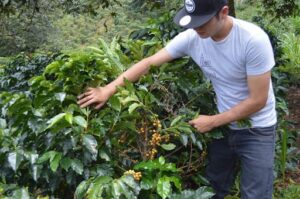
Orange Bourbon
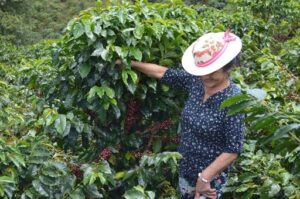
Red Bourbon
The on-site beneficio had several trials running of different processing methods, and the solar dryers were totally meticulous – every single lot was recorded with picking date, processing details, varietal, and various other data. It’s little surprise that Andrès finished second in the Cauca Best Cup competition, which Cafe Imports have run for a couple years. Best Cup is an awesome competition and sourcing exercise rolled into one, with a load of roasters and farmers, giving the opportunity to meet, discuss, and set up long term relationships, all culminating in a big live auction followed by a huge party. It makes a genuine difference too: Andrès sells his coffee to a roaster in Kentucky, whom he met at the first Best Cup competition.
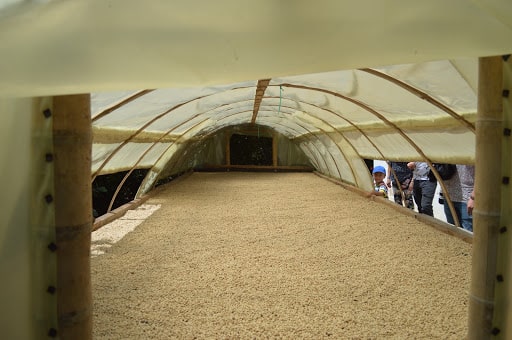
Dodging the rain showers, we drove back to the Banexport warehouse and HQ on the edge of Popayan, and got ready to assess another load of samples. Chatting to a few farmers who had arrived from nearby farms we were also able to understand a little more about the model that Banexport employs in helping farmers find a suitable market, and in improving the coffee quality. This covers agronomy support, processing expertise, as well as advice on varietals, harvesting, and explanation of the role of an exporter in matching up trader and roaster requirements with the coffee that flows into their warehouses.
The next batch of samples to taste included one that we ended up buying which is from the ARGCAFFE group of farmers, situated in a remote southern part of Cauca state, in an area where the coca cartels operate. One of their aims as an association is to encourage farmers to switch from growing coca to growing coffee, and banding together as an association helps them find a market for their coffee. They’ve been working with Verve Coffee Roasters out of Santa Cruz for a few years, but that relationship had ended, so we were really glad to start the process of working with them. Their story is really promising.
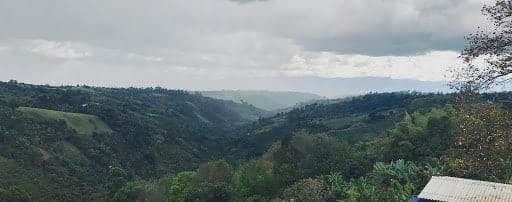
Neighbourhood Coffee needs your consent to use cookies on this website. We use cookies to better understand what visitors do on the website and where they come from.
You can read more about this on our Privacy & Cookie Policy.
Please select your cookie preferences.